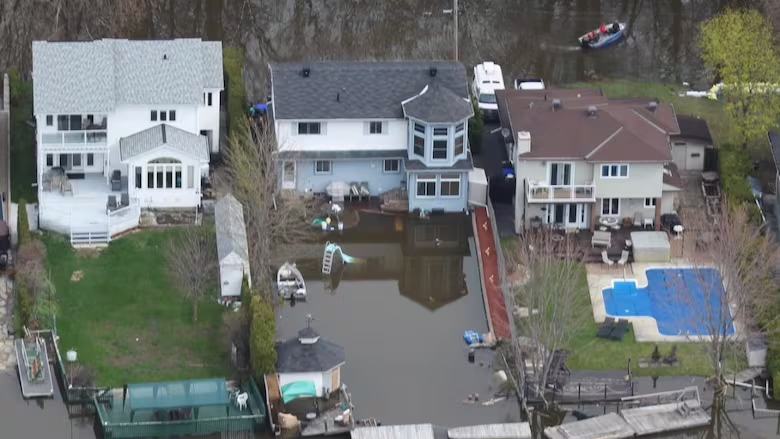Gatineau flood victim awaits aid in gutted home as winter nears
'I'm going to deal with it one day at a time. I don't know what I'm going to do,' Masson-Angers homeowner says

Winter is coming, and Roxanne Briand's house in the east Gatineau community of Masson-Angers has neither insulation nor a furnace.
Briand and her partner were forced from their home near the Ottawa River during spring flooding on May 3, after spending three weeks trying to keep the water out.
Winter is getting close and we're wondering if we're going to be able to hold on.- Roxanne Briand
The basement flooded entirely and the main floor took on about 15 centimetres of water.
They stayed in a motel for two months, during which time they emptied their home's sodden basement, tore up the main floor and pulled out all the water-logged insulation.
But as the weeks dragged on without inspection reports or damage assessments from the province to finance repairs, they eventually decided to move back into to their gutted home.
Now Briand is calling on the Quebec government speed up aid for flood victims like her.
'Winter is getting close'

"Everything's just put together temporarily because we know that it's all got to come out again anyway. But winter is getting close and we're wondering if we're going to be able to hold on."
Briand blames disorganization and a lack of adequately trained staff for the delays.
"I think they have put people in place who they call analysts who don't really understand the program, and I don't know how that can happen.... You have different people, different analysts, who give different answers to the same question. So it seems like nobody really knows which way to turn on this whole thing," she said.
Protest held over the weekend
The Quebec government says 278 municipalities were flooded this spring and more than 5,000 residences affected, while 4,000 people had to be evacuated from their homes.
Public Security Minister Martin Coiteux has repeatedly asked the public for patience as the government works its way through thousands of requests for assistance.
In July, Coiteux said he'd hired a task force to speed up the process and that the reports would be ready by mid-August.

But Sunday, several dozen frustrated homeowners who had still not received the promised reports held a rally in Montreal to protest the government's response to the spring floods.
Briand attended.
"I don't know anybody who's been flooded who buys the explanation ... about the delays," she said. "We all have quite good ideas. If he wants to meet with us, we could give him some clues on how we can accelerate the whole process."
'Personal response' promised
At a news conference later Tuesday morning in Montreal, Coiteux announced a series of measures meant to provide a "direct and personal response" to flood victims.
"I'm certainly not here to tell you everything we're doing is perfect. I'm here to say the opposite. It's not perfect, and I'm telling you we're hearing the message on the ground that we could be doing better," he said during a news conference in Montreal's Pierrefonds Tuesday morning, one of the areas worst hit by the flooding that inundated hundreds of homes.
Coiteux said the government will organize days where representatives from affected municipalities and the province will be available under one roof to answer any questions residents may have about their compensation claims.
There will also be new agreements with community organizations to help those still living in hotels, he said.
The other measures are more administrative, aimed at improving communication and information sharing between different levels and branches of government, and cutting red tape.
'A huge, tremendous amount of stress'
The task force hired in July hasn't helped, Briand said. No one on her street has been able to rebuild so far.
"If these people actually knew how the program worked and were familiar in the same way... the problem is the inconsistencies throughout the whole thing," she said.
"It's unbelievable. It's a huge, tremendous amount of stress, anxiety — you can throw in all of those words. Most people are now being put on medication to deal with all of this, and what's it like? It's very sad. Because we do live in Canada, we have a great country, and we should be able to help our own people.
"I'm going to deal with it one day at a time. I don't know what I'm going to do."